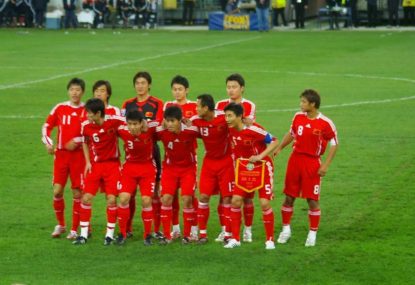Mariners star striker Torres charged with aggravated sexual assault and given 'no-fault' suspension
Central Coast Mariners' star striker Angel Torres has been stood down from playing in the A-League Men after he was charged with sexual assault. …

While Bangladesh and Australia fought it out in the dust of Dhaka, many in Asia were tuning in to what would normally be little more than a novelty match: Hong Kong versus China.
In early September, Hong Kong travelled to the Middle Kingdom and through some structured defence, managed to hold the Chinese to a 0-0 draw.
The draw saw China placed third in their group, three points adrift of Hong Kong, albeit with a game in hand.
The Chinese threw all they had at the reverse fixture and played with far more endeavour, rattling the woodwork twice and seeing a goal denied for ‘not crossing the line’.
However Hong Kong also came to play, and not only held out the Chinese but managed to control the midfield. China played technically well but were tactically bereft.
The result was greeted like a win from the local crowd, who – if the boos ringing out during the Chinese national anthem is any indicator – were somewhat partisan. This wasn’t just due to the fact that it was a point against China, but also because the result leaves China unlikely to proceed to the next round of World Cup qualification.
For football fans, nothing garnishes a result like a liberal sprinkling of schadenfreude.
So how can it come to this… Again?
The performance of Guangzhou Evergrande in the ACL over the past few seasons has some of the Chinese players engaging successfully in the highest level of football in Asia – certainly higher than what anyone in the Hong Kong squad contends.
Yet here lies part of the problem. Chinese players are at risk of emulating their West Asian counterparts, where the best players remain in the domestic competition, as opposed to testing their abilities in the tougher sporting climes of Europe.
In Japan and Korea, the talented are encouraged to be the best, not just the richest. This leads them to play in many leagues around the globe, leagues where foreign imports are under immense pressure to prove themselves worthier than local talent. They are expected to perform, to sparkle, and to think.
The amount of money available in the Chinese Super League means clubs can purchase substantial, creative foreign talent, talent upon which local players rely. When these imports are removed, there are few Chinese players remaining with experience in delivering creative spark on the big stage.
It is no accident that Zheng Zhi, the only Chinese national team player with significant European experience, remains the side’s lynchpin.
The result of this is seen in the difficulty the Chinese side has in changing tactics mid-game, which leads to the side running out of ideas and growing frustrated as games wear on. The spark and creativity are lacking, and as the pressure grows so do the ugly tackles and the backchat.
The game is evolving in China, with substantial investment in youth football and a changing attitude to child rearing. However the Chinese national side risks being held down by the glass ceiling of domestic football hubris.
The Chinese need to encourage their players to test themselves in order to be the best, not just the wealthiest.